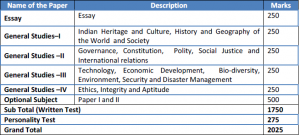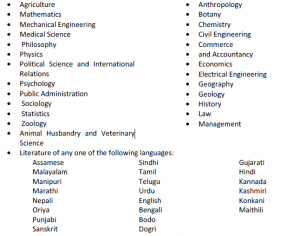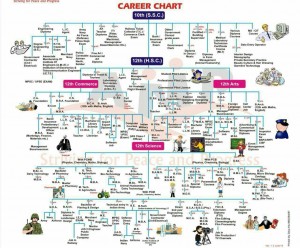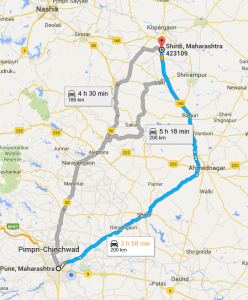The competitive examination comprises two successive stages:
I. Civil Services (Preliminary) Examinations (Objective Type) for the selection of candidates for Main Examination; and
II. Civil Services (Main) Examination
PRELIMINARY EXAMINATION
The questions are of multiple choices, objective type.
Paper I – (200 marks) Duration: Two hours
- Current events of national and international importance
- History of India and Indian National Movement
- Indian and World Geography – Physical, Social, Economic Geography of India and the World.
- Indian Polity and Governance – Constitution, Political System, Panchayat Raj, Public Policy,Rights Issues, etc.
- Economic and Social Development Sustainable Development, Poverty, Inclusion, Demographics,Social Sector initiatives, etc.
- General issues on Environmental Ecology, Bio-diversity and Climate Change – that do not require subject specialization
- General Science
Paper II- (200 marks) Duration: Two hours
- Comprehension
- Interpersonal skills including communication skills
- Logical reasoning and analytical ability
- Decision-making and problem-solving
- General mental ability
- Basic numeracy (numbers and their relations, orders of magnitude, etc.) (Class X level), Data interpretation (charts, graphs, tables, data sufficiency etc. – Class X level)
- English Language Comprehension skills (Class X level)
The question papers are set both in Hindi and English.
Note: From 2014 prelims CSAT paper is of Qualifying nature where student need to get minimum 33% i.e. 66 Marks out of 200 Marks. These marks will not be counted in Prelims result.

Apart from this there will be papers on regional language (Paper A) and English (Paper B), 300 marks each. But these will be only of qualifying nature. There marks will not be counted in final analysis but the papers on Essay, General Studies and Optional Subject of only such candidates will be taken cognizance who attain 25% marks in Indian Language and 25% marks in English as minimum qualifying standards in these qualifying papers.
Marks obtained by the candidates for all papers mentioned in above table will be counted for merit ranking. However, the Commission will have the discretion to fix qualifying marks in any or all papers of the examination.
Candidates will have the option to answer all the question papers, except the Qualifying Language papers Paper-A and Paper-B, in any of the languages included in the Eighth Schedule to the Constitution of India or in English. Candidates exercising the option to answer Papers in any one of the languages may give English version within brackets of only the description of the technical terms, if any, in addition to the version in the language opted by them. Candidates should note that if they misuse the above rule, a deduction will be made from the total marks.
- The main Examination is intended to assess the overall intellectual traits and depth of understanding of candidates rather than merely the range of their information and memory.
- The mains questions are such as to test a candidate’s general awareness of a variety of subjects, which will have relevance for a career in Civil Services.
- The questions are likely to test the candidate’s basic understanding of all relevant issues, and ability to analyze, and take a view on conflicting socio- economic goals, objectives and demands.
- The candidates must give relevant, meaningful and succinct answers.
- If a candidate’s handwriting is not easily legible, a deduction is made on this account from the total marks otherwise accruing to him.
Marks are not allotted for mere superficial knowledge.
- Credit is given for orderly, effective and exact expression combined with due economy of words in all subjects of the examination.
- The scope of the syllabus for optional subject papers for the examination is broadly of the honours degree level i.e. a level higher than the bachelors’ degree and lower than the masters’ degree. In the case of Engineering, Medical Science and law, the level corresponds to the
bachelors’ degree.
- The question papers for the examination are of conventional (essay/descriptive) type.
- Each paper is of three hours duration.
Syllabi of the papers included in the scheme of Civil Services (Main) Examination are given as follows:-
Compulsory Languages
The aim of the paper is to test the candidates’ ability to read and understand serious discursive prose, and express his ideas clearly and correctly, in English and Indian Language concerned. The pattern of questions is broadly as follows :-
(i) Comprehension of given passages (ii) Precis Writing (iii) Usage and Vocabulary (iv) Short Essays Indian Languages :- (i) Comprehension of given passages (ii) Precis Writing (iii) Usage and Vocabulary (iv) Short Essays (v) Translation from English to the Indian language and vice versa.
Essay
Candidates may be required to write essays on multiple topics. They are expected to keep closely to the subject of the essay to arrange their ideas in orderly fashion and to write concisely. Credit is given for effective and exact expression.
General Studies- I
Indian Heritage and Culture, History and Geography of the World and Society
- Indian culture will cover the salient aspects of Art Forms, Literature and Architecture from ancient to modern times.
- Modern Indian history from about the middle of the eighteenth century until the presentsignificant events, personalities, issues
- The Freedom Struggle – its various stages and important contributors /contributions from different parts of the country.
- Post-independence consolidation and reorganization within the country.
- History of the world will include events from 18th century such as industrial revolution, world wars, redrawal of national boundaries, colonization, decolonization, political philosophies like communism, capitalism, socialism etc.- their forms and effect on the society.
Salient features of Indian Society, Diversity of India.
- Role of women and women’s organization, population and associated issues, poverty and developmental issues, urbanization, their problems and their remedies.
- Effects of globalization on Indian society
- Social empowerment, communalism, regionalism & secularism.
- Salient features of world’s physical geography.
- Distribution of key natural resources across the world (including South Asia and the Indian subcontinent);
- Factors responsible for the location of primary, secondary, and tertiary sector industries in various parts of the world (including India)
- Important Geophysical phenomena such as earthquakes, Tsunami, Volcanic activity, cyclone etc., geographical features and their location- changes in critical geographical features (including water bodies and ice-caps) and in flora and fauna and the effects of such changes.
General Studies- II
Governance, Constitution, Polity, Social Justice and International relations
- Indian Constitution- historical underpinnings, evolution, features, amendments, significant provisions and basic structure.
- Functions and responsibilities of the Union and the States, issues and challenges pertaining to the federal structure, devolution of powers and finances up to local levels and challenges therein.
- Separation of powers between various organs dispute redressal mechanisms and institutions.
- Comparison of the Indian constitutional scheme with that of other countries
- Parliament and State Legislatures – structure, functioning, conduct of business, powers & privileges and issues arising out of these.
- Structure, organization and functioning of the Executive and the Judiciary Ministries and Departments of the Government; pressure groups and formal/informal associations and their role in the Polity.
- Salient features of the Representation of People’s Act.
- Appointment to various Constitutional posts, powers, functions and responsibilities of various Constitutional Bodies.
- Statutory, regulatory and various quasi-judicial bodies
- Government policies and interventions for development in various sectors and issues arising out of their design and implementation.
- Development processes and the development industry- the role of NGOs, SHGs, various groups and associations, donors, charities, institutional and other stakeholders
- Welfare schemes for vulnerable sections of the population by the Centre and States and the performance of these schemes; mechanisms, laws, institutions and Bodies constituted for the protection and betterment of these vulnerable sections.
- Issues relating to development and management of Social Sector/Services relating to Health, Education, Human Resources.
- Issues relating to poverty and hunger.
- Important aspects of governance, transparency and accountability, e-governance- applications,models, successes, limitations, and potential; citizens charters, transparency & accountability and institutional and other measures.
- Role of civil services in a democracy.
- India and its neighborhood- relations.
- Bilateral, regional and global groupings and agreements involving India and/or affecting India’s interests
- Effect of policies and politics of developed and developing countries on India’s interests, Indian Diaspora.
- Important International institutions, agencies and fora- their structure, mandate.
General Studies-III
Technology, Economic Development, Bio diversity, Environment, Security and Disaster Management
- Indian Economy and issues relating to planning, mobilization of resources, growth, development and employment.
- Inclusive growth and issues arising from it.
- Government Budgeting.
- Major crops cropping patterns in various parts of the country, different types of irrigation and irrigation systems; storage, transport and marketing of agricultural produce and issues and related constraints; e-technology in the aid of farmers
- Issues related to direct and indirect farm subsidies and minimum support prices; Public Distribution System- objectives, functioning, limitations, revamping; issues of buffer stocks and food security; Technology missions; economics of animal-rearing.
- Food processing and related industries in India- scope and significance, location, upstream and downstream requirements, supply chain management.
- Land reforms in India.
- Effects of liberalization on the economy, changes in industrial policy and their effects on industrial growth.
- Infrastructure: Energy, Ports, Roads, Airports, Railways etc.
- Investment models.
- Science and Technology- developments and their applications and effects in everyday life Achievements of Indians in science & technology; indigenization of technology and developing new technology. Awareness in the fields of IT, Space, Computers, robotics, nano-technology,
bio-technology and issues relating to intellectual property rights.
- Conservation, environmental pollution and degradation, environmental impact assessment Disaster and disaster management.
- Linkages between development and spread of extremism.
- Role of external state and non-state actors in creating challenges to internal security.
- Challenges to internal security through communication networks, role of media and social networking sites in internal security challenges, basics of cyber security; money-laundering and its prevention
- Security challenges and their management in border areas; linkages of organized crime with terrorism
- Various Security forces and agencies and their mandate
General Studies- IV
Ethics, Integrity, and Aptitude
Ethics and Human Interface: Essence, determinants and consequences of Ethics in human actions; dimensions of ethics; ethics in private and public relationships. Human Values – lessons from the lives and teachings of great leaders, reformers and administrators; role of family,
society and educational institutions in inculcating values.
- Attitude: content, structure, function; its influence and relation with thought and behaviour; moral and political attitudes; social influence and persuasion.
- Aptitude and foundation values for Civil Service , integrity, impartiality and non-partisanship, objectivity, dedication to public service, empathy, tolerance and compassion towards the weaker sections.
- Emotional intelligence-concepts, and their utilities and application in administration and governance.
- Contributions of moral thinkers and philosophers from India and world.
- Public/Civil service values and Ethics in Public administration: Status and problems; ethical concerns and dilemmas in government and private institutions; laws, rules, regulations and conscience as sources of ethical guidance; accountability and ethical governance; strengthening
of ethical and moral values in governance; ethical issues in international relations and funding; corporate governance.
- Probity in Governance: Concept of public service; Philosophical basis of governance and probity;
- Information sharing and transparency in government, Right to Information, Codes of Ethics, Codes of Conduct, Citizen’s Charters, Work culture, Quality of service delivery, Utilization of public funds, challenges of corruption.
- Case Studies on above issues.
Optional Subject
Optional Subject Papers I & II: Please check the syllabus in UPSC Notification published on http://upsc.gov.in/exams/notifications/

PERSONALITY TEST (INTERVIEW)
- The candidate is interviewed by a Board who has before them a record of his/her career. He/she is asked questions on matters of general interest. The objective of the interview is to assess the personal suitability of the candidate for a career in public service by a Board of competent and unbiased observers. The test is intended to judge the mental caliber of a candidate. In broad terms this is really an assessment of not only his/her intellectual qualities but also social traits and his/her interest in current affairs. Some of the qualities that are judged are mental
alertness, critical powers of assimilation, clear and logical exposition, balance of judgment, variety and depth of interest, ability for social cohesion and leadership, intellectual and moral integrity.
- The technique of the interview is not that of a strict cross-examination but of a natural, though directed and purposive conversation which is intended to reveal the mental qualities of the candidate.
- The interview test is not intended to be a test either of the specialized or general knowledge of the candidates which has been already tested through their written papers. Candidates are expected to have taken an intelligent interest not only in their special subjects of academic
study but also in the events which are happening around them both within and outside their own state or country as well as in modern currents of thought and in new discoveries which should rouse the curiosity of well educated youth.
For more details and coaching classes contact below address:
SYNERGY STUDY POINT
590, Shivam Complex, Narayan Peth, Near
S.N.D.T. Kanya Shala,
PUNE – 411030
Contact Us: 9850981796 02065001045



